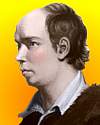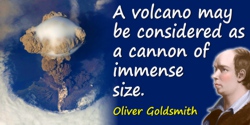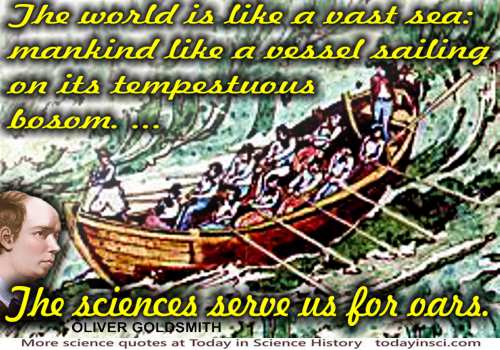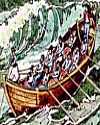Today in Science History - Quickie Quiz
 (source)
(source)
|
Oliver Goldsmith
(10 Nov 1730 - 4 Apr 1774)
Irish-English writer and playwright whose literary works include the novel The Vicar of Wakefield (1766) and the play She Stoops to Conquer (1773). His eight volumes of A History of the Earth and Animated Nature (1774) was not a work of scholarship, but used natural history information from others, which he rewrote as popular science reading. The series was reprinted in over twenty editions for decades after his death.
|
Oliver Goldsmith - Sciences Serve Us For Oars.
Illustrated Quote - Medium (500 x 350 px)
“The world is like a vast sea: mankind like a vessel sailing on its tempestuous bosom. ... The sciences serve us for oars.”
— Oliver Goldsmith
'Letters from a Chinese Philosopher', LXXXIII.
The context of Oliver Goldsmith’s “Sciences Serve Us For Oars” quote
After receiving a B.A. degree in Dublin (Feb 1749), Oliver Goldsmith began, but exhausted his funding before completing study at the medical school in Edinburgh. Instead he ended up London, working at various jobs, including an apothecary's assistant. From 1759, he found he had a marketable skill in writing, and became an essayist published in various journals. A series of his Chinese Letters essays were collected and published in book form as Citizen of the World (1762). In these, he satirized Western society in the commentary and philosophy of a ficticious Chinese visitor to London.
The concluding paragraph of his Letter LXXXIII, ('From Lien Chi Altangi to Hingpo, by way of Moscow') began with these two sentences:
“The world is like a vast sea, mankind like a vessel sailing on its tempestuous bosom. Our prudence is its sails, the sciences serve us for oars, good or bad fortune are the favourable or contrary winds, and judgment is the rudder; without this last, the vessel is tossed by every billow, and will find shipwreck in every breeze.”
From concluding paragraph, 'Letters from a Chinese Philosopher', LXXXIII, first published in journal
The Public Ledger collected in
The Miscellaneous Works of Oliver Goldsmith (1762, 1809), 41.
(source)
![Oliver Goldsmith quote: [T]here are depths of thousands of miles which are hidden from our inquiry. The only tidings we have fro](https://todayinsci.com/G/Goldsmith_Oliver/GoldsmithOliver-DepthsThm.jpg)
Volcano Sunset - Mount Shishaldin, Japan
(source)

Eruption of Sarychev volcano, Matua Island, Russia, seen from International Space Station (12 Jul 2009)
(source)
See also:
- Science Quotes by Oliver Goldsmith.
-
Oliver Goldsmith - context of “Mankind like a vessel on tempestuous sea…Sciences serve us for oars” quote - with large image (800 x 600 px)
Nature bears long with those who wrong her. She is patient under abuse. But when abuse has gone too far, when the time of reckoning finally comes, she is equally slow to be appeased and to turn away her wrath. (1882) --
Nathaniel Egleston, who was writing then about deforestation, but speaks equally well about the danger of climate change today.
 Carl Sagan
Carl Sagan: In science it often happens that scientists say, 'You know that's a really good argument; my position is mistaken,' and then they would actually change their minds and you never hear that old view from them again. They really do it. It doesn't happen as often as it should, because scientists are human and change is sometimes painful. But it happens every day. I cannot recall the last time something like that happened in politics or religion. (1987) ...
(more by Sagan) Albert Einstein: I used to wonder how it comes about that the electron is negative. Negative-positive—these are perfectly symmetric in physics. There is no reason whatever to prefer one to the other. Then why is the electron negative? I thought about this for a long time and at last all I could think was “It won the fight!” ...
(more by Einstein) Richard Feynman: It is the facts that matter, not the proofs. Physics can progress without the proofs, but we can't go on without the facts ... if the facts are right, then the proofs are a matter of playing around with the algebra correctly. ...
(more by Feynman)
 (source)
(source)



![Oliver Goldsmith quote: [T]here are depths of thousands of miles which are hidden from our inquiry. The only tidings we have fro](https://todayinsci.com/G/Goldsmith_Oliver/GoldsmithOliver-DepthsThm.jpg)





